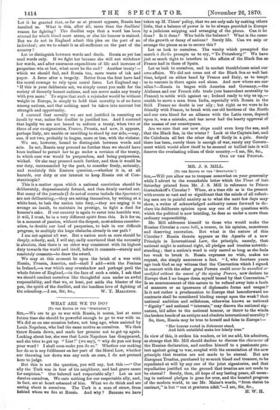MR. J. S.
[TO THE EDITOR OF THE " SPECTATOR-1 SIR, —Will you allow me to trespass somewhat on your generosity while I advert to the remarkable letter which the Times of last. Saturday printed from Mr. J. S. Mill in reference to Prince- Gortschakoff's Circular ? When, at a time rife as is the present with events so vast and so significant that the minds of all reflect- ing men are in painful anxiety as to what the next few days may- show, a writer of acknowledged authority comes forward to de- clare his deliberate opinion upon any one of the questions with' which the political is now bristling, he does so under a more than, ordinary responsibility.
Mr. Mill addresses himself to those who would make the- Russian Circular a casus belli, a course, in his opinion, monstrous. and deserving execration. But what is the nature of this. Circular ? Russia therein appears as the Apostle of a new Principle in International Law, the principle, namely, that- national might is national right, all pledges and treaties notwith- standing; that a nation's word is only sacred so long as she feels- too weak to break it. Russia expresses no wish, makes no- request, she simply announces a fact. "I, who fourteen years. ago took God as my witness that the Convention which I signed. in concert with the other great Powers could never be annulled or- modified without the assent of the signing Powers, now declare to- Europe that I no longer deem myself bound by that Convention.' Is an announcement of this nature to be refined away into a fault of manners or an ignorance of diplomatic forms and usages ?' Is it not rather a proclamation to Europe that henceforward no- contracts shall be considered binding except upon the weak? that. national ambition and selfishness, otherwise known as national. " dignity " and national "interests," may disown the national sig- nature, bid adieu to the national honour, or throw to the winds the broken bonds of an antique and obsolete international morality ?•
So, then, Russia may be true to herself and false to Europe !—
" Her honour rooted in dishonour stand, And faith unfaithful make her falsely true."
In view of this, it strikes his readers, or let me add, his admirers,. as strange that Mr. Mill should decline to discuss the character of the Russian declaration, and confine himself to a passionate pro- test against going to war, coupled with the enunciation of the new principle that treaties are not made to be eternal. But are European Treaties, purchased by so much blood and treasure, to be repudiated at will by any one of the joint signatories, and that repudiation justified on the ground that treaties are not made to.- be eternal ? Surely, then, all hope of any lasting peace, all mean- ing in national pledges is gone for ever, and the boasted progress of the modern world, to use Mr. Maine's words, "from status to, contract," is but "vox et prmterea nibil."—I am, Sir, &c.,
H. W. H.


































 Previous page
Previous page